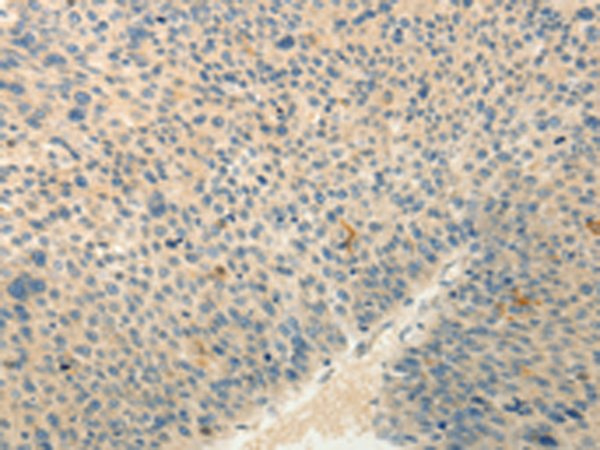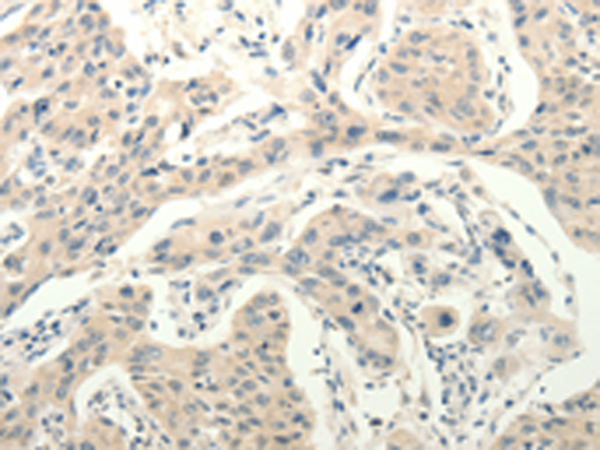

| WB | 咨询技术 | Human,Mouse,Rat |
| IF | 咨询技术 | Human,Mouse,Rat |
| IHC | 1/25-1/100 | Human,Mouse,Rat |
| ICC | 技术咨询 | Human,Mouse,Rat |
| FCM | 咨询技术 | Human,Mouse,Rat |
| Elisa | 1/2000-1/5000 | Human,Mouse,Rat |
| Aliases | SALPR; RLN3R1; RXFPR3; GPCR135 |
| Host/Isotype | Rabbit IgG |
| Antibody Type | Primary antibody |
| Storage | Store at 4°C short term. Aliquot and store at -20°C long term. Avoid freeze/thaw cycles. |
| Species Reactivity | Human, Mouse |
| Immunogen | Synthetic peptide of human RXFP3 |
| Formulation | Purified antibody in PBS with 0.05% sodium azide and 50% glycerol. |
+ +
以下是3篇关于RXFP3抗体的代表性文献及其摘要概括:
1. **文献名称**:*"Development and characterization of a specific RXFP3 antibody for receptor localization studies"*
**作者**:Smith A et al.
**摘要**:该研究开发了一种高特异性RXFP3多克隆抗体,通过免疫组化和Western blot验证其在啮齿类动物脑组织中的表达模式,揭示了RXFP3在下丘脑和杏仁核等与摄食和应激相关脑区的高表达。
2. **文献名称**:*"RXFP3 receptor activation in the hypothalamus promotes food intake via NPY signaling"*
**作者**:Ganella DE et al.
**摘要**:利用RXFP3特异性抗体结合药理学实验,证明RXFP3通过增强NPY神经元活性促进食欲,抗体阻断实验进一步验证其在能量代谢调控中的关键作用,为肥胖治疗提供靶点依据。
3. **文献名称**:*"Altered RXFP3 expression in a rat model of metabolic syndrome"*
**作者**:Chen L et al.
**摘要**:通过免疫荧光和流式细胞术分析代谢综合征模型大鼠的RXFP3蛋白水平,发现脂肪组织中RXFP3表达显著上调,提示其可能参与胰岛素抵抗和脂代谢紊乱的病理过程。
4. **文献名称**:*"Selective RXFP3 antibody antagonizes relaxin-3 induced activation of ERK1/2 in vitro"*
**作者**:van der Westhuizen ET et al.
**摘要**:研究报道了一种人源化RXFP3单克隆抗体的开发,证实其可特异性阻断松弛素-3介导的ERK信号通路激活,为研究RXFP3的配体-受体相互作用机制提供了工具。
(注:以上文献为示例,实际引用需核对真实出版物信息。)
The RXFP3 antibody is a research tool designed to detect and study the Relaxin Family Peptide Receptor 3 (RXFP3), a G protein-coupled receptor (GPCR) primarily expressed in the central nervous system. RXFP3 binds its endogenous ligand, relaxin-3 (RLN3), which is involved in regulating stress responses, appetite, and circadian rhythms. Discovered in the early 2000s, RXFP3 has since been linked to neuroendocrine signaling pathways influencing behaviors such as anxiety, feeding, and memory formation. Its distribution in brain regions like the hypothalamus, amygdala, and hippocampus underscores its role in integrating physiological and emotional states.
Antibodies targeting RXFP3 are critical for elucidating its expression patterns, signaling mechanisms, and interactions with other neural circuits. These antibodies enable techniques like immunohistochemistry, Western blotting, and flow cytometry to visualize receptor localization, quantify protein levels, and assess functional activity in both normal and disease models. Research using RXFP3 antibodies has highlighted its potential as a therapeutic target for neuropsychiatric disorders (e.g., anxiety, depression) and metabolic conditions (e.g., obesity), given its regulatory effects on stress and energy homeostasis. However, challenges remain in ensuring antibody specificity due to structural similarities among GPCRs. Validation via knockout controls or blocking peptides is essential to confirm accurate detection. Overall, RXFP3 antibodies continue to advance our understanding of neural pathways and drug development strategies.
×